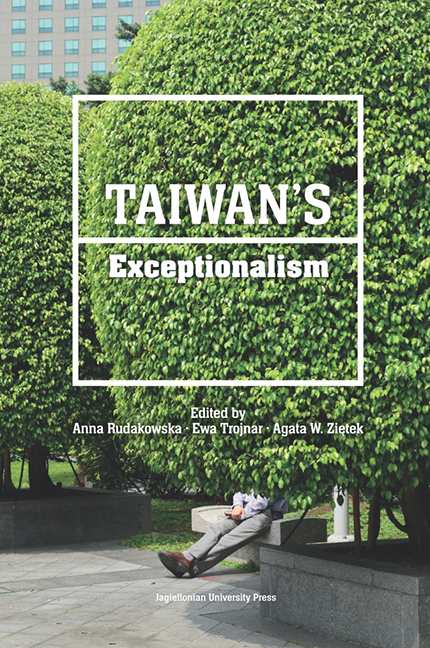Book contents
- Frontmatter
- Contents
- 1 Unpacking Taiwan's Exceptionalism: Themes and Studies
- 2 The Legal Status of Taiwan under International Law
- 3 Taiwan’s Unique Position Toward the South China Sea
- 4 Taiwan-China-United States Relations: Taiwan’s Unique Safe House for Better or Worse
- 5 Exceptionalism under a Glass Ceiling? Taiwan’s Democratic Development and Challenges
- 6 The Sunflower Movement: An Example of the Dynamics of Civic Activity in Taiwan
- 7 The Development of Indigenous Tourism Clusters in Taiwan: Economic and Cultural Foundations of Sustainability
- 8 A Shark Paradise in Taiwan (Dis)appears: From Shark Soup to Shark Diving
- 9 Taipei’s Soft Power at Work: The Image of Taiwan in Polish Dailies “Gazeta Wyborcza” and “Rzeczpospolita”
- Contributors
- List of Figures
- Index
2 - The Legal Status of Taiwan under International Law
Published online by Cambridge University Press: 16 July 2022
- Frontmatter
- Contents
- 1 Unpacking Taiwan's Exceptionalism: Themes and Studies
- 2 The Legal Status of Taiwan under International Law
- 3 Taiwan’s Unique Position Toward the South China Sea
- 4 Taiwan-China-United States Relations: Taiwan’s Unique Safe House for Better or Worse
- 5 Exceptionalism under a Glass Ceiling? Taiwan’s Democratic Development and Challenges
- 6 The Sunflower Movement: An Example of the Dynamics of Civic Activity in Taiwan
- 7 The Development of Indigenous Tourism Clusters in Taiwan: Economic and Cultural Foundations of Sustainability
- 8 A Shark Paradise in Taiwan (Dis)appears: From Shark Soup to Shark Diving
- 9 Taipei’s Soft Power at Work: The Image of Taiwan in Polish Dailies “Gazeta Wyborcza” and “Rzeczpospolita”
- Contributors
- List of Figures
- Index
Summary
Abstract: As a geopolitical unit, Taiwan encompasses the island of Taiwan and the Penghu (Pescadores) Islands, as well as the Mazu (Matsu) and Jinmen (Kinmen) islands off the coast of mainland China. Its official name is the Republic of China. From an international legal standpoint, it is not at all clear whether Taiwan, as it has just been described, is a sovereign state, part of a state, or a completely distinct entity. An array of opinions on this topic has emerged among scholars of international law. The following article presents some of the critical issues surrounding the legal status of Taiwan.
Keywords: legal status, international recognition
Introduction: The Taiwanese Problem during and after World War II
Taiwan came under Japanese rule through the Treaty of Shimonoseki of April 17, 1895 under the island's erstwhile name – Formosa. Under the terms of the Treaty, Imperial China ceded sovereignty over the island to Japan perpetually, along with the Pescadores Islands and all of their fortifications, their arsenal, and publicly owned property (Article II).
As part of the Cairo Declaration of November 26, 1943, the heads of state of the Republic of China, the United States, and Great Britain announced their intention to return all territories that had formerly belonged to the Republic of China and that Japan had taken by force. Manchuria, Formosa, and the Pescadores Islands were named explicitly in the Declaration. The subsequent Potsdam Declaration defined the circumstances of unconditional surrender of the Japanese forces to the Allies; henceforth, the sovereignty of Japan would be circumscribed to the islands of Honshu, Hokkaido, Kyushu, Shikoku, and minor islands determined at a later date. Japan accepted these conditions of surrender without question on September 2, 1945.
In accordance with the Supreme Allied Commander's order, the Japanese forces that remained in mainland China and Taiwan surrendered to the Chinese army following the Potsdam Declaration. In October of 1945, Taiwan was already under restored Chinese rule and promptly became a province of China. On January 12, 1946, a decree was passed that reinstated Chinese citizenship for all inhabitants of Taiwan.
- Type
- Chapter
- Information
- Taiwan's Exceptionalism , pp. 19 - 30Publisher: Jagiellonian University PressPrint publication year: 2022

